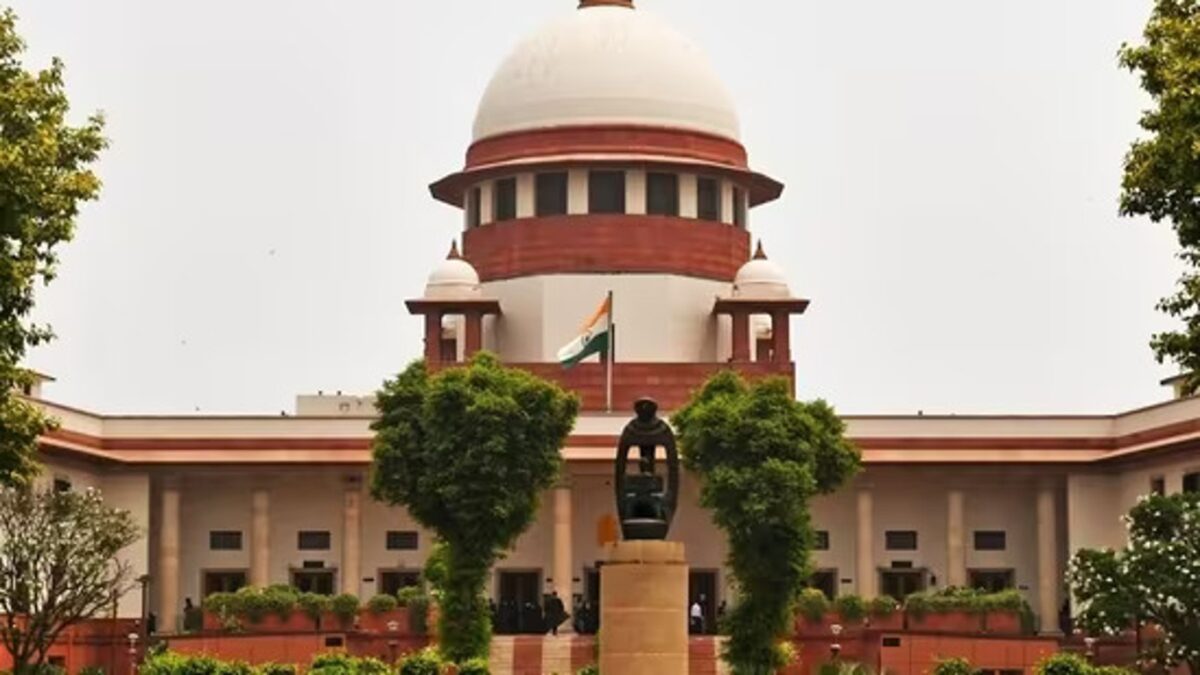The Menace Of Manels
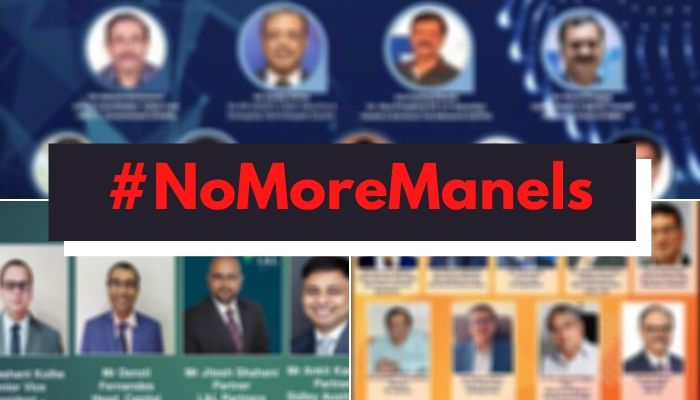
Written By: Rajkanya Mahapatra, 🖊 edited by Varna
In the wake of the global pandemic, people were asked by their governments to stay indoors and practice social distancing, in order to contain the spread of the coronavirus. In India, the lockdown began on March 25, 2020. As people began to adjust to working from home, it was assumed that everyone would have a lot more free time on their hands as they were not stepping out anymore. Fitness influencers, comedians, food and grocery delivering apps, think tanks, and trade associations (to name a few) all spurred into action to catch hold of people’s attention.
Video conferencing platforms like Zoom, Google Meet, Facebook and Instagram Live, and the like, made it possible for industry leaders and experts from various sectors to come together to discuss niche topics. This is a great development for everyone who wants to keep learning. The pandemic should have enabled conference organisers to reach out to a variety of diverse stakeholders since more and more industry leaders and experts are now going only-digital. For some reason this seems to have not happened and is reflective of systemic exclusion (biased hiring practices, not-so-accommodative rules and regulations, lack of facilities) of women and other marginalised groups and identities from extension of formal spaces like conferences.
Since the lockdown Ungender has been tracking webinars and panels on Twitter and in our inboxes, for male-only representation, otherwise known as manels or all-male panels. In this piece we focus on a small sample of 57 manels to share observations on the range of participants, the topics discussed and what these manels mean for the cause of Diversity and Inclusion (D&I) at the workplace.
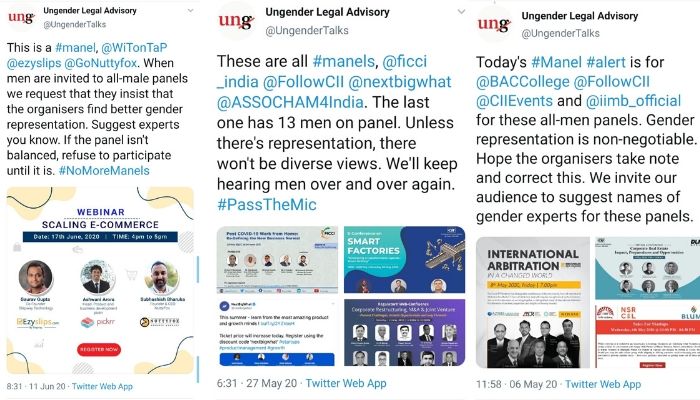


Meet Your Everyday Average Manel
On the Twitterverse, there are hundreds of tweets with the hashtags #Manel and #NoMoreManels. The UngenderTalks account calls out manels that appear on its home-feed from April 08, 2020 to June 29, 2020, because this selection is driven by Twitter’s algorithm and is determined by usage of the hashtag itself rather than on Ungender’s own curation of manels, it is fair to say that the manels that constitute our sample represent the average manel.
Now in the average manel, we find that topics discussed ranged from the impact of the pandemic on businesses, the future of work, on private equity and venture capital funds, on healthcare, especially, mothers and their newborns, and also, cybersecurity and digital inclusion.
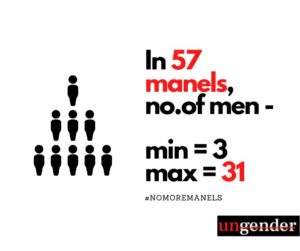


Each manel had an average of seven participants with a minimum of three and a maximum of 31 participants!
In some instances, the manels were gracious enough to include a single woman but not all panels were that considerate. The Indian Pediatrics Association (IPA) and FIGO (International Federation of Gynaecology and Obstetrics) with support from the international non-governmental institutions WHO and UNICEF, organised a panel that had four men discussing the essentials required for a mother and their newborn during the pandemic. It didn’t seem strange, to these organisations engaged in global development work, to discuss the issue of maternal health without getting a female expert’s opinion.
Male participants in manels come from some of India’s top companies such as Nestle, Accenture, KPMG and JCB India, amongst others. There were also manelists from startups, banks, the hospitality industry, governmental departments, and more. Manels are organised, it seems, chiefly, by government bodies and associations like the Confederation of Indian Industry (CII), NITI Aayog, FICCI and ASSOCHAM. Of the 57 manels, Ungender tracked, 24.5% were organised or co-organised by the CII. Ungender has made repeated calls for better representation in CII’s panels to no avail.
What’s Wrong With Manels?
All male panels serve as brutal reminders of who occupies the most space, has the most agency and enjoys the most amount of legitimacy and visibility in the Indian workforce. Manels also shed light on the lack of women and other genders in leadership and senior roles at corporates, trade associations, research organisations – you name the industry and it’s likely that the gender, class, caste demographics reflect the power distribution in the society. All-male panels also mean that we’re missing out on diverse perspectives. The themes addressed in all of these manels have an impact on the lives of all people, not just men, some impact women more than they impact men.
The first time Ungender highlighted the lack of women on a CII panel was on April 20, 2020 when they organised a discussion on the “Best HR Practices during COVID-19”. A month and a half and eight manels later, CII organised it’s biggest manel on cybersecurity with 19 men on it! As of June 29, 2020, CII’s largest manel had 31 men on it. The other manels organised by the CII discussed a wide range of issues from water conservation, future of digitization to dairy and fisheries.
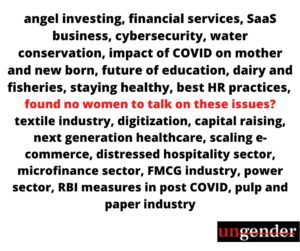


It seems quite a stretch to believe that the CII Team could not identify or reach women or folks from other genders who could be invited to add perspective to the work CII does. It is deeply worrying that despite urging the organisation to work on its gender representation, the manels continue to come. For example, an HR best practice manel could have featured many of India’s leading HR practitioners who are women, it could then have become a real panel.
A few women who could’ve been added to the “Best HR Practices” panel are Nandita Gurjar, senior HR professional and former HR Head at Infosys, Susan Mathew, Head HR at LinkedIn India, and Ira Gupta, Head HR at Microsoft India. As for the panel on cybersecurity, again just to name a few women who could’ve been on that manel are Vandana Verma, Security Architect at IBM India Software Labs, Nappinai NS, SC Advocate expert in cyber crime and laws, Vandita K, Lead Solutions Advisor at Deloitte India, and Neelu Tripathy, Security Practice Lead at ThoughtWorks.
[It took Ungender an hour to find women who could feature on both panels. What’s your excuse, really?]Commitment to the cause of D&I needs to come from the senior leadership within an institution. Unfortunately, CII which identifies itself as “the premier business association of modern India” has had four male presidents till date and has had only one female president since 1975.
Manels Need To Go
Webinars and conferences where people weigh in on important matters give shape to discourse on that subject. It’s absolutely essential that discourse includes more diverse perspectives that can be taken into account during policy making or contribute to better practices at workplaces. If the current trend of manels are anything to go by, the consolidation of power and agency by men will continue unabated.
How hard really is it to find women or people from other genders if only one made an attempt to ask? On June 18, Constantino Xavier, a research fellow at Brookings India, called out a mega manel that had 16 men who were invited to speak on “Current Trajectory of India’s Foreign Policy” organised by the Department of Political Science at Shaheed Bhagat Singh Evening College. Shortly after, two academics got together to start a spreadsheet that has a list of women who are experts in matters of foreign policy and international relations. You can check the sheet here. At the time of writing this – in just about a day they’d managed to add 338 names! Let’s just say, it is definitely possible to find women who have the experience and knowledge to contribute to panel discussions, if only one would go looking for them.
Once you strike out the availability of women panelists, the probability of which is extremely low, that leaves only one thing that needs doing — banish manels. Industry leaders, teams organising and managing these panels, and invited panelists need to take a step back and re-prioritise. We’re two decades into the 21st century, how long are we going to take to fix these gender imbalances?
We’ll have to ensure it doesn’t take long if we ever want to go far.
Note: You can refer to the spreadsheet for the complete list. If you spot any manels, please use this form to let us know!
Also Read: LGBTQIA Voices On Going Beyond Recruitment At The Workspace
About the author: At Ungender, Rajkanya writes about the many ways modern workplaces can become inclusive. As a graduate student, she’s exploring the location of gender in issues of cyber security, artificial intelligence and violent extremism. She’s previously worked with the online social justice media platform – Youth Ki Awaaz as an editor.
Ungender Insights is the product of our learning from advisory work at Ungender. Our team specializes in advising workplaces on workplace diversity and inclusion. Write to us at contact@ungender.in to understand how we can partner with your organization to build a more inclusive workplace.
Read our insights about diversity, legal updates and industry knowledge on workplace inclusion at Ungender Insights. Visit our Blog.
Sign up to stay up-to-date with our free e-mail newsletter.
The above insights are a product of our learning from our advisory work at Ungender. Our Team specialises in advising workplaces on gender centric laws.
or email us at contact@ungender.in



